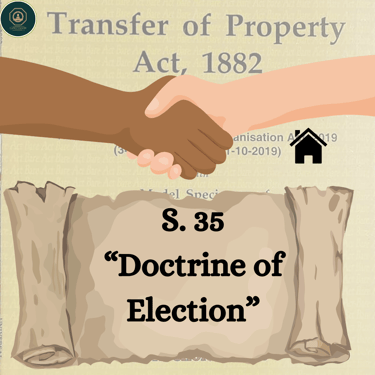Doctrine of Election, Transfer of Property Act, 1882
In this blog, the author has discussed the doctrine of election under section 35 of TPA, its fundamentals and the mode of election. Further, the author has supported the blog with illustration and case laws.
Khushi Gera
5/28/20243 min read


Doctrine of Election under Transfer of Property Act, 1882
Introduction
Election in a simple sense means the choice between two conflicting rights. It is a commitment forced upon a party by the court to settle on a decision between two conflicting rights and he shouldn't appreciate both.
Legal Arrangement
The doctrine is managed under section 35 of The Transfer of Property Act, 1882 (TPA) which states that election is the obligation imposed upon a party by courts of equity to choose between two inconsistent or alternative rights or claims in cases where there is a clear intention that he should not enjoy both.
Fundamentals of Doctrine under section 35
The fundamentals can be specified as follows:
• The transferor declares to move property that isn't his own.
• In a similar exchange, the benefit is presented to the proprietor of the property.
• The proprietor should either affirm the transfer or contradict it.
• On the off chance that he contradicts, he will surrender the advantage so presented.
• The advantage so surrendered, returns to the transferor or his agent where: a) The transfer is gratuitous and the transferor before the election dies, becomes unequipped to make a new transfer and b) The transfer is for consideration.
Then, the disappointed (frustrated) transferee must be made good (compensated) the losses equivalent to how much property endeavoured to be transferred.
Illustration:
The farm of Sultanpur is the property of C and is worth Rs. 800. A, by an instrument of gift, purports to transfer it to B, giving by a similar instrument for Rs. 1,000 to C. C chooses to hold the farm. He relinquishes the endowment of Rs. 1,000. In a similar case, A dies before the election. His delegate should out of the Rs. 1,000 compensation Rs. 800 to B.
Mode of Election
Acknowledgement of the advantages by the individual on whom they are presented constitutes an election if: a) He knows about his obligation to choose. b) He knows about those conditions that would impact the judgment of a reasonable man in making an election, or c) He waives inquiry into the conditions.
For the situation where the proprietor, after following the above-said arrangements has intentionally acknowledged the advantages, it implies he has acknowledged the transaction. An assumption is drawn towards acknowledgement where: a) He enjoys the advantage for two years without doing any demonstration to communicate contradiction. b) He truly does some demonstration by which reestablishing the party to its original position becomes impossible.
Illustration
A transfers to B a home to which C is entitled, and as a part of a similar transaction gives C a coal mine. C claims the mine and debilitates it. He has in this way affirmed the transfer of the home to B.
Case Law
Muhammad Afzal v. Gulam Kasim (1903), is a landmark case on the point portrayed below:
• FACTS - On the death of Nawab of Tank, the Public authority transferred a cash allowance to Nawab's second child. Nawab, during his lifetime, had previously transferred towns to his second child for his support.
• Question - Whether the two transactions were a piece of a similar transaction, and might the principle of election at any point be applied to this situation?
• Decision - The Privy Council for this situation held, that as the second child procured grants through two different sources, they don't frame part of the same transaction and the second child can't be put to election.
Conclusion
The doctrine of election depends on the Latin proverb 'quod approbo non reprobo' which means ‘what I approve, I can't disapprove’. An individual who chooses in this manner can't decide to choose the piece of instrument or transaction that is useful to him and decide to dismiss the other part. He who accepts the benefit under a deed will adopt the whole contents of the instrument, which means that the person taking the benefit should also bear the burden


